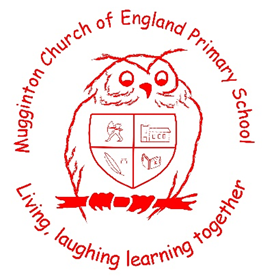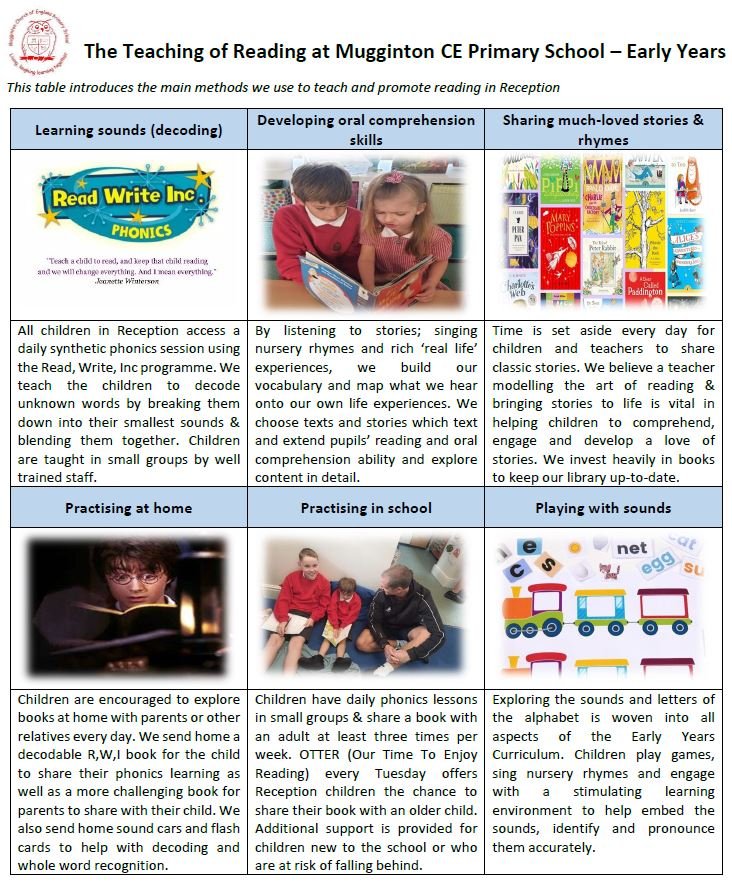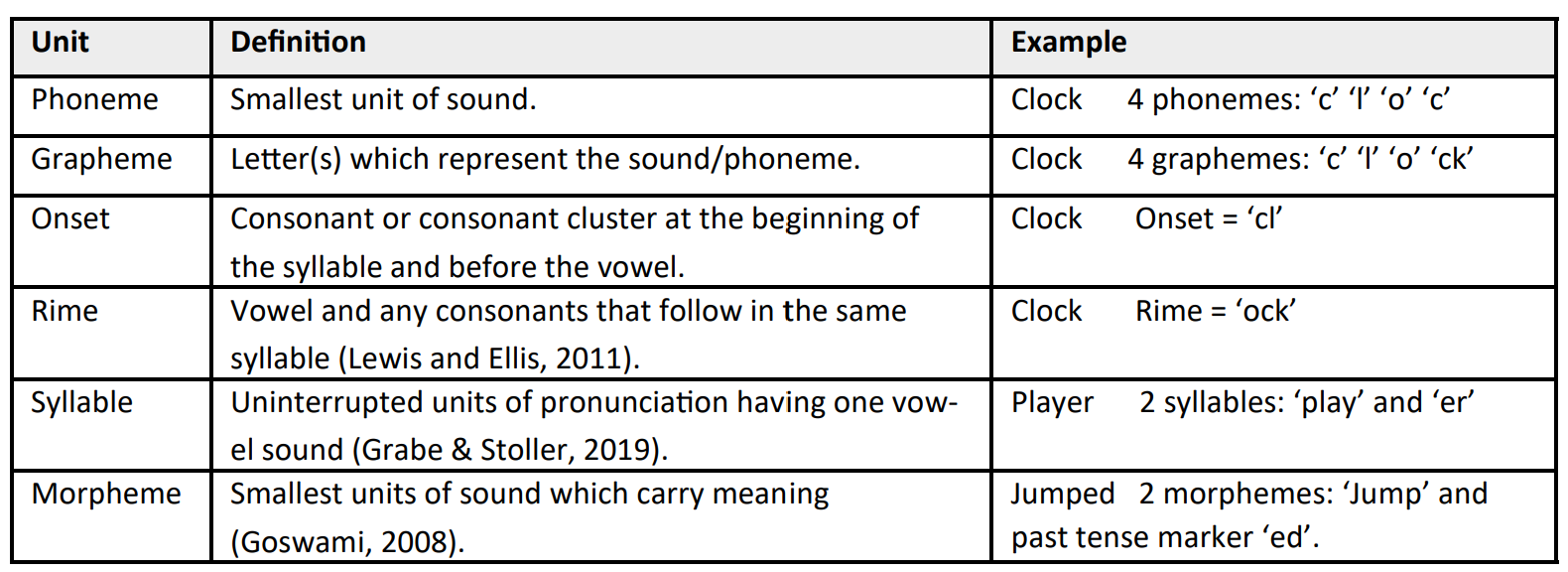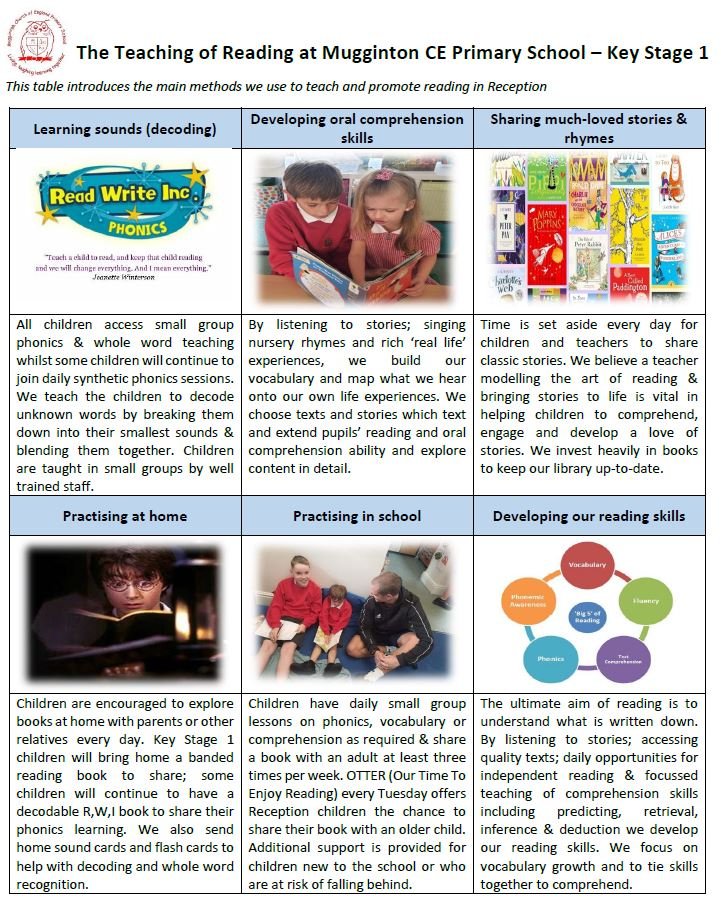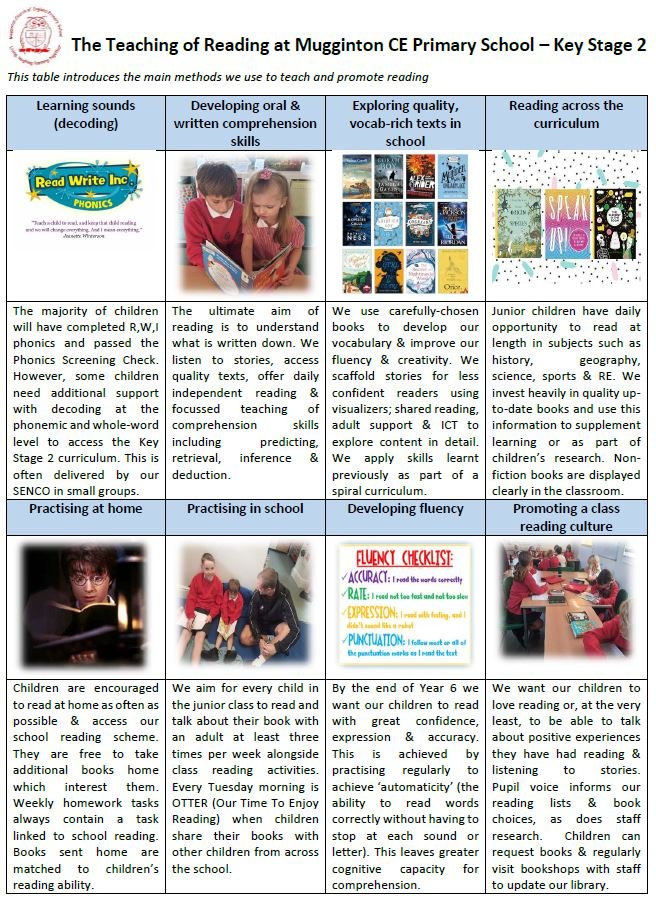
Phonics & reading at mugginton
At Mugginton Church of England Primary School, we define reading as the process of extracting meaning from text. This involves ‘dynamic interaction’ between one’s existing knowledge, information suggested by the text and the context of the reader. After safeguarding, we consider reading to be the most important focus of our school.
At Mugginton Church of England Primary School, we define reading as the process of extracting meaning from text and this involves ‘dynamic interaction’ between one’s existing knowledge, information suggested by the text and the context of the reader. After safeguarding, we consider reading to be the most important focus of our school.
We believe that decoding is a vital part of the reading process and systematic synthetic phonics teaching begins on the first day children enter school in Reception. However, without focus on the ‘fuzzy’ part of reading (for example, self-concept, motivation and classroom relationships), reading cannot be adequately researched, defined or taught. To access the meaning of words and sentences, children must understand the relationship between letters and sounds, referred to as ‘grapheme to phoneme correspondences’ or GPCs (Seymour, 2006).
Phonics instruction can be defined as the teaching of the sounds of a (alphabetic) language. This often involves focussing on the smallest unit of sound – the phoneme - although it need not necessarily be limited to teaching at this ‘grain size’ (Goswami, 2002). Larger units of sound are taught in some types of phonics instruction (table 1 below outlines sub-word level grain sizes).
However, the ultimate goal of reading is comprehension – building up a representation of the phrase, sentence or passage read (Harley, 2013) – and this is reliant upon the richness of the child’s total experience and memory. The common element in the discussion and definitions outlined above is the emphasis on meaning and the fact that reading involves the extraction of meaning from text (Goswami, 2008). Therefore, we believe that quality systematic synthetic phonics teaching alongside a literacy-rich classroom culture with texts meaningfully used, embedded and linked to our children’s real world experiences is the best way to maintain outstanding outcomes in reading and promote reading for pleasure. The very latest scientific research, including meta-analyses, support this belief.
Click here to read about one of our junior children’s experience of reading at Mugginton…….
Read Write Inc Phonics
At Mugginton C of E Primary School, we use the RWI phonics scheme to teach the children phonics from their very first day in Reception until they are confident to hear, say and read all 44 phonemes. A phoneme is the smallest unit of sound in speech. (For example, the word ‘hat’ has 3 phonemes, h-a-t. The word ‘cream’ has 4 phonemes, c-r-ea-m, but is made up of 5 letters.) This is usually when they are in Year 2 but, as with everything, children learn differently and some may need greater support and time to consolidate their understanding.
The children learn new sounds at appropriate rates, depending on their level of maturity and ability to listen and learn. They may begin by learning a sound each day, until they have built up a bank of phonemes with which they can learn to blend and form CVC words. Examples include words such as 'cat', 'sit', 'dog', 'mum' etc, that can be easily sounded out and blended. Once the children are able to blend and are incorporating the new sounds into their developing reading and writing, they learn the phonemes at a steadier rate, giving time to consolidate each blend before moving onto new phonemes.
Read, Write Inc Phonics Books
These books support the children's learning and encourage them to blend the sounds together in easily decodable words. Children begin taking these books home when they have been taught the Set 1 RWI sounds. They take these home alongside books from the coloured reading scheme. These are important to help build upon and reinforce their phonic knowledge. We encourage parents to enjoy the different sections of the book in short stints:
* Speed Sounds: Read through the Speed Sounds, ensuring children sound the letters (graphemes) out correctly (as modelled at our Parents' Meeting).
* Green and Red Words: Read through these key words – Green are decodable using phonics, red are ‘tricky words’ which must be remembered whole (such as ‘the’). Encourage children to put the words into sentences verbally. They can write the words (ensuring correct spelling) and/ or sentences.
* Read the story (some have more than 1 story, read one at a time).
* Answer the 'Questions to talk about', at the back of the book. Young children are to do this verbally, encouraging the use of full sentences. Year 1 and 2 children can write down the answers in full sentences as this will help their ability to complete more challenging reading comprehension activities as they progress through school.
* Speedy Words at the back of the book. Have fun timing the children and see if they can increase their speed reading all the words.
Infant Parents’ Information Evening. Every year, Mrs Wallen (our Phonics Lead) welcomes parents in to school to go through our arrangements for the teaching of phonics with the children and to share resources. The PowerPoint from the September 2022 meeting is available here
Banded Reading Books
Children will take home a reading book from a coloured band, on their first day with us. The initial lilac band books are so important in encouraging the children to handle a book correctly, look carefully at the pictures and discuss the characters, their feelings, and make predictions about what might happen. As children learn a few of the Set 1 sounds and begin to be able to blend them together, we move them onto books from the Pink band, initially focussing on the phonetically decodable texts, before offering a range of ORT, Rigby Star and Collins Big Cat books. Children then continue their reading journey, working through the books at a rate appropriate to them. We always emphasise the importance of learning to love reading and encourage children to develop their own interests in texts, reading extensively at home and exploring topics and hobbies.
Through providing high quality phonics teaching and immersing our children in high quality texts, our aim is to foster a love of reading. We support parents in encouraging more reluctant readers through working with them and providing individual books that follow their child’s needs and interests. We promote the benefit of sharing books with children that are beyond their reading ability, helping the development of a rich, broad vocabulary, vivid imagination and, most importantly, interest in and love of books.
High Frequency Words and Spellings (Our Word Wizard Words!)
We are trialling a new spelling system in the infant classroom this year, with the aim of building good spelling into everyday practice and encouraging the learning of spellings to be more meaningful and positive. The children in Year 1 and 2 all have a plastic folder, in which they have their ‘word wizard words’. These are completely personalised and are words that the individual child needs to practise. They begin with 5 words on small coloured squares which are taken form their literacy books, topic and early morning activity books. These are taken home and parents are encouraged to help the children learn their words through:
* Putting the words into sentences. Have fun making some silly sentences. Read them and write them down.
* Play games such as putting all the words face down and take turns to turn the cards over, seeing who can say the word first.
* Make another set and play pairs with the word cards.
Each Friday, the words will be changed and added to, as appropriate, in our Word Wizard sessions. These sessions focus on word and sentence level work. Children are given additional time to practise their word wizard words during early morning activities and busy learning opportunities. This system works well. The children are taking much greater ownership of their spellings, rather than just learning them for a weekly test.
More than anything, however, we want to instill a love of reading in our children. In cases where children do not enjoy reading, we are committed to changing this mindset by engaging with the child to find books on a subject they enjoy. At the very least, all children will be able to discuss books they have read and been exposed to whilst at our school. In short, we aim for a balance between decoding skills and a rich linguistic environment from the very beginning of primary school.
Click here for our Reading Long Term Overview for 2024 - 2025 for Years 3 & 4
Click here for our Reading Long Term Overview for 2024 - 2025 for Years 5 & 6

Further advice is available here:
